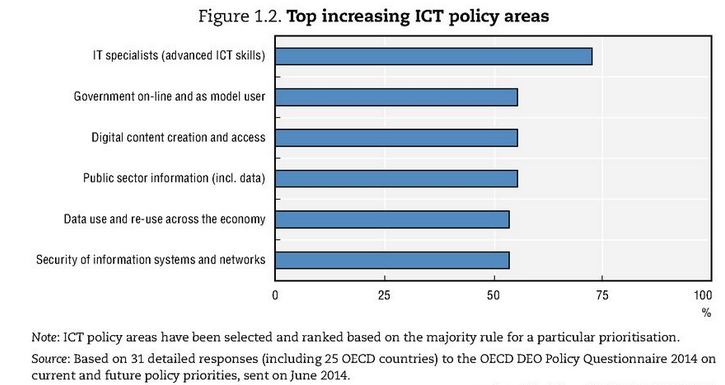OECD, (2015), Entrepreneurship at a Glance 2015, OECD Publishing, Paris, August. Executive summary Entrepreneurship at a Glance contains a wide range of internationally comparable measures of entrepreneurship designed to inform analysis and policy on entrepreneurship and entrepreneurs, reflecting their important contribution to innovation, employment and growth. Start-up rates have been on an upward trend since the crisis in many countries, particularly in Australia and the United Kingdom, and more recently in Denmark, Portugal and Sweden. In …Read More
Euro Area Policies
International Monetary Fund, (2015), “Euro Area Policies”, IMF Country Report No. 15/204, 27 July The recovery is strengthening, underpinned by lower oil prices and the ECB’s expanded asset purchase program. But the medium-term outlook remains weak, weighed down by the legacies of insufficient demand, lagging productivity, and weak bank and corporate balance sheets. Relevant Posts IMF, (2015), “Greece: An Update of IMF Staff’s Preliminary Public Debt Sustainability Analysis”, July. IMF Country …Read More
OECD Digital Economy Outlook 2015
OECD, (2015), OECD Digital Economy Outlook 2015, OECD Publishing, Paris, July. The digital economy now permeates countless aspects of the world economy, impacting sectors as varied as banking, retail, energy, transportation, education, publishing, media or health. Information and Communication Technologies are transforming the ways social interactions and personal relationships are conducted, with fixed, mobile and broadcast networks converging, and devices and objects increasingly connected to form the Internet of things. This …Read More
The stabilising properties of a European Banking Union in case of financial shocks in the Euro Area
Breuss, Fritz, Roeger, Werner, In ’t Veld, Jan, (2015), “The stabilising properties of a European Banking Union in case of financial shocks in the Euro Area”, European Commission publications, Economic Papers 550, June 2015 This paper analyses the stabilising properties of a European Banking Union in case of financial shocks in the euro area. We compare output losses under national interventions (‘bail-out’) with resolution mechanisms included in the banking union, namely resolution via the euro area’s …Read More
When ‘Secular Stagnation’ meets Piketty’s capitalism in the 21st century. Growth and inequality trends in Europe reconsidered
Pichelmann, Karl, (2015), “When ‘Secular Stagnation’ meets Piketty’s capitalism in the 21st century. Growth and inequality trends in Europe reconsidered”, European Commission publications, Economic Papers 551, June 2015 Europe not only continues to struggle to leave the legacies of the crisis behind it; economic growth remains also weighed down by unfinished macroeconomic adjustment and sluggish implementation of reforms, as well as long-standing poor productivity growth trends. Against that background, the spectre of “secular stagnation” has …Read More
An event-study analysis of ECB balance sheet policies since October 2008
Briciu, Lucian, Lisi, Giulio, (2015), “An event-study analysis of ECB balance sheet policies since October 2008”, European Commission publications, Economic Brief 001, July 2015 Using an event-study approach, this paper provides an impact analysis of seven sets of balance sheet policies (BSPs) launched by the ECB between October 2008 and January 2015. According to the event-study results, the set of ECB BSPs announced in 2014 had the broadest immediate impact on euro area financial conditions, though possibly …Read More
Causes and Consequences of Income Inequality : A Global Perspective
Dabla-Norris, Era, Kochhar, Kalpana, Suphaphiphat, Nujin, Ricka, Frantisek, Tsounta, Evridiki, (2015), “Causes and Consequences of Income Inequality : A Global Perspective”, IMF Publications, 15 June This paper analyzes the extent of income inequality from a global perspective, its drivers, and what to do about it. The drivers of inequality vary widely amongst countries, with some common drivers being the skill premium associated with technical change and globalization, weakening protection for labor, and lack of financial inclusion in developing countries. …Read More
Financial Stability Review
European Central Bank, (2015), Financial Stability Review, May. Euro area financial system stress has remained low over the past six months, despite a certain increase in global financial market volatility. Broad-based indicators of financial market and banking system risk have generally fluctuated at low levels and stood in mid-May around the marks observed before the outbreak of the sovereign debt crisis (see Chart 1). The low overall level of financial system …Read More
The Monetary Policy of the European Central Bank (2002-2015)
Miscossi, St., (2015), “The Monetary Policy of the European Central Bank (2002-2015)”, CEPS Special Report, 22 May 2015. This paper examines the policies pursued by the European Central Bank (ECB) since the inception of the euro. The ECB was originally set up to pursue price stability, with an eye also to economic growth and financial stability as subsidiary goals, once the primary goal was secured. The application of a single monetary …Read More
In It Together: Why Less Inequality Benefits All
In It Together: Why Less Inequality Benefits All, OECD, 21 May The gap between rich and poor keeps widening. Growth, if any, has disproportionally benefited higher income groups while lower income households have been left behind. This long-run increase in income inequality not only raises social and political concerns, but also economic ones. It tends to drag down GDP growth, due to the rising distance of the lower 40% from the rest …Read More





